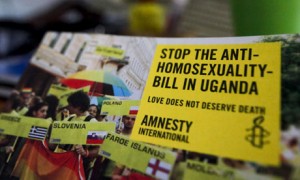Anti-gay backlash threatens aid and rights in Africa
Published on May 17, 2011 at 1:12 PM by FACE OF MALAWI

Uganda's anti-gay bill has been deemed out of time for the current sittings of parliament and its proponents are unlikely to be able revive it for some time. Photograph: Dai Kurokawa/EPA
Many countries worldwide are marking International Day Against Homophobia – but in Malawi and Uganda gay rights are being eroded in a new climate of repression.
Started six years ago, International Day Against Homophobia (IDAHO) now encompasses events in countries worldwide, including in China, Nigeria, Kenya and dozens in the UK. On 17 May 1970, homosexuality was removed from the International Classification of Diseases published by the World Health Organisation (WHO).
This was an early redrawing of the “norms” in international organisations around homosexuality. To mark IDAHO 2011, the UN high commissioner for human rights, Navi Pillay, released an addresss in which she spoke out against hate crimes against lesbian, gay, bisexual and transgender (LGBT) people, and the UN produced its first-ever brochure highlighting its official position on sexual orientation and gender identity human rights.
This latest redrawing has prompted an organised backlash, led by the Organisation of the Islamic Conference (OIC) and some African countries, and a move to redefine human rights permitting religion to exclude not just homosexuality but some women’s rights issues.
In Malawi, arrests for homosexuality and a new law criminalising lesbians have contributed to the withdrawal of some aid, and to other aid being renegotiated.
Last week a rift opened up between Malawian NGOs at a press conference in Lilongwe about the expulsion of the British ambassador in April following his leaked diplomatic criticism of the president. The press conference deteriorated into a “blame the gays” exercise. Voice Mhone, who directs the Council for Non-Governmental Organisations, described LGBT human rights as a “distraction from the many issues affecting the vast majority of Malawians”.
But in Malawi, as in Uganda, the inclusion of LGBT human rights in discussions around aid comes in the wider context of human rights concerns. Uganda has been directly threatened with having its aid withdrawn by numerous countries, including the US, which said it would use its leverage in places like the World Bank, over Uganda’s infamous “Kill The Gays” bill.
That anti-homosexuality legislation was not put to a vote last week in the Ugandan parliament as expected, but this was probably not due to international pressure. Women staged a walkout of parliament on Wednesday over the failure to pass a much-needed divorce bill. Another bill of serious concern to women, on HIV prevention, also failed. Neither bill has received much attention while the Anti-Homosexuality Bill (AHB) has gathered more than two million signatures on petitions.
Last week, however, the media attention on Uganda was not about the AHB: instead, the focus was on the inauguration of President Museveni and the return of opposition leader Kissa Besigyne. While the world’s attention was elsewhere, Museveni’s security forces repressed street protests against price rises, corruption and human rights abuses.
Those who oppose the AHB, such as the 31 members of Uganda’s Civil Society Coalition on Human Rights and Constitutional Law, made clear that those who provide international support must make links between the general and specific human rights situations – unfortunately, however, they have not and there was no similar international campaign against Museveni’s clampdown.
In sub-Saharan Africa, homosexual men suffer significantly higher rates of HIV than the general population. One new study in Soweto by the Global Forum on MSM and HIV showed a 50% infection rate. There are similarly high rates elsewhere in Africa.
Increasingly, NGOs, international organisations and some leaders are spelling out the role that official and societal repression of homosexuality plays in the transmission of HIV/Aids. They are funding small organisations targeting gay men and other marginalised and criminalised minorities such as sex workers — those whom Voice Mhone believes are a distraction from Malawi’s problems – despite the fact that 10% of Malawians are HIV-infected.


